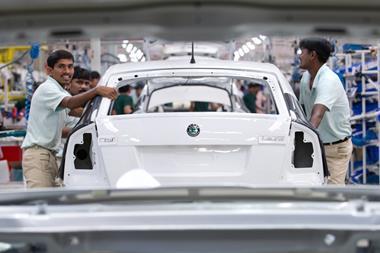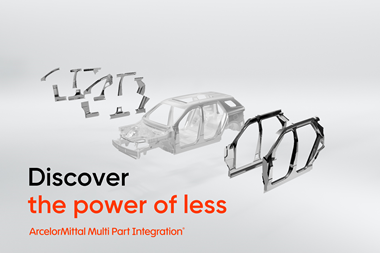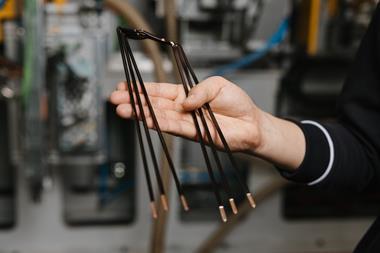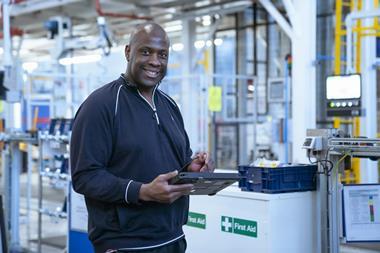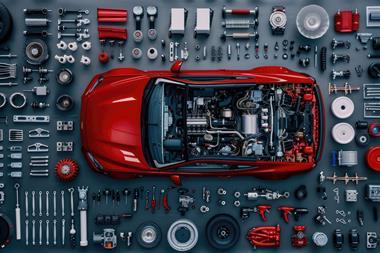With new opportunities opening up, the independent pressings and stampings sector continues to evolve
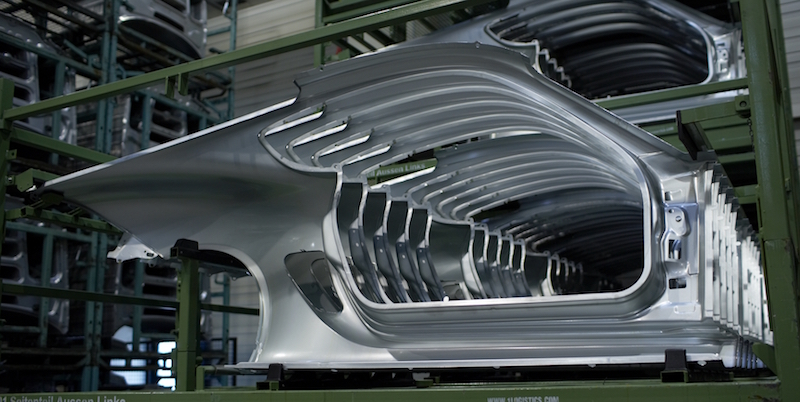 With car-makers focusing on new, demanding and regulation-driven technologies – especially in emissions, connectivity, autonomous and electric cars – limitations in terms of their resources and capabilities mean that further opportunities are opening up for the likes of Gestamp, Magna and others.
With car-makers focusing on new, demanding and regulation-driven technologies – especially in emissions, connectivity, autonomous and electric cars – limitations in terms of their resources and capabilities mean that further opportunities are opening up for the likes of Gestamp, Magna and others.
Car companies make almost all of the class-A finish exterior panels on their vehicles themselves; there are some exceptions (such as the Porsche Macan referred to below) but the overwhelming majority of the visible body of the car is stamped, from steel or aluminium, by the car companies’ in-house press shops.
Mostly this takes place at the relevant car assembly plant, however, in some cases there is a complex internal supply chain for pressings: for example, GM ships pressings around Europe between its plants – some parts pressed in the UK go to Poland, while others pressed in Poland end up in Germany. GM even sends some pressings from its components plant at Kaiserslautern to its external seat frame makers or seat assembly plants, so the car company’s own factory acts as a tier two or three supplier.
The exceptions to the ruleWhile most of the independent companies in this sector produce non-visible, underbody or structural pressings and assemblies, there are some intriguing exceptions to this rule; one such is Tower Automotive, a US company which has also operations in Europe, for example in Belgium to supply Volvo there and also in eastern Germany. Its plant at Zwickau makes body pressings and skin panels, especially for the VW Group.
[sam_ad id=17 codes='true']
Specifically, it supplies around 80% of the outer panels for the Porsche Macan; the factory also makes pressings for underbody assemblies for the Porsche Cayenne, Audi Q7 and Volkswagen Touareg. What makes this case especially intriguing is that Tower’s plant at Zwickau – now heavily modernised and replete with an €11m ($11.7m) hot-stamping line from AP&T, installed in 2015 – used to make the (infamous) Trabant car.
In recent years the external pressings market has changed, notably through consolidation, with a mixture of planned acquisitions and companies exiting the business. In parallel, the emergence of hot stamping as a key process has offered the supply base the chance to invest and secure long-term business as most vehicle companies have chosen to outsource some or all of this process. VW and Fiat are among the car companies that have installed their own hot-stamping lines, but both – especially VW – also use external suppliers, notably Gestamp and Tower, as demand for parts made by this technology has mushroomed.
Consequently, as in other areas of the car, the external pressings sector is seeing a number of major players emerge as international players, notably Magna, Gestamp and Kirchhoff; steel company VoestAlpine has set up a body structures operation that operates worldwide but has recently invested heavily in North America; this forward integration approach has rarely been tried by the steel companies. ThyssenKrupp used to have some significant business in structural stampings but exited this business some time back.
From small town Spain to the international stageThe growth of Gestamp from a small Spanish company into one of the global leaders in this sector owes much to the recent emergence of hot stamping as a core process technology. The company was one of the first to invest in the technology, notably at its Griwe plant in Germany, but has also made significant acquisitions in this area, first with SSAB Hardtech of Sweden, followed by Sofedit of France, which it acquired from ThyssenKrupp. It also bought Tallent in the UK from ThyssenKrupp.

Gestamp has also invested in its own operations in hot stamping in North America, Spain and most recently in the UK – a £70m ($88.6m) investment was announced prior to the UK voting to leave the EU, and which has been reconfirmed for the post-Brexit future. This new investment, in a purpose-built factory in Cannock near Birmingham, will use conventional hot-stamping systems and a new hot-stamping technique, using a transfer servo press line. It is also investing in its Tallent factory at Newton Aycliffe in the north-east of England, where it has installed two new presses that are said to ensure the factory’s future for the next 30 years. The presses themselves were sourced from a Spanish supplier, located close to Gestamp’s home plant in Spain; having been tried out and proved to work, the presses were stripped down and shipped to the UK for re-assembly use. They will supply parts not only to JLR, Nissan and Honda in the UK, but elsewhere in Europe to Volvo and Ford.
Gestamp had bought the French operation, Sofedit, from ThyssenKrupp back in 2011, since when it has invested around €33m in the plant in a new (fourth) hot-stamping line, upgrading an existing line and adding laser cutting equipment for finishing the hot-stamped parts. Gestamp has not just acquired companies outside Spain, but at home too; in July 2016 it acquired 60% of fellow Spanish pressings company, Estampaciones Sabadell, having taken a 40% stake back in 2011. One of the attractions of Sabadell is the longevity of its contracts – for example, in 2014 it was given a contract through to 2027 to supply frames for the Mercedes Viano/Vito MPV/van programme.
Gestamp now has a turnover of more than €7 billion a year, generated from more than 100 global production sites. It is reported to be planning an IPO some time in 2017 and an idea of the value of the business came in 2016 when Japanese company, Mitsui, acquired a 12.5% stake.
Magna expands in pressings tooCanadian company Magna has also grown through acquisition; its Cosma division contains its pressings and stampings operations. Recent acquisitions include Stadco in the UK (which has its own acquisition history, having bought the UK operations of Japanese supplier Ogihara in 2011, and the remnants of Mayflower, another acquisitive pressings company when it exited the automotive business). The UK company, now integrated into Magna’s Cosma division, had been a long-time supplier to JLR and GM, as well as Ford Saarlouis. Magna is boosting its UK operations by building a new facility in Telford to supply JLR with structural castings from 2018.
Magna is also a major investor in new plants of its own, for example its plant in Emiliano Zapata, Morelo in Mexico, Magna’s 31st plant in the country, opened in 2015. Located 100km south of Mexico City, it makes structural welded assemblies for Nissan in particular. Further afield, it has opened a plant in Chongqing, China to supply Ford and VW, building on existing pressings and stamping operations in China, in Shanghai, Changchun and Changsha.
Japanese firms active in Europe and North AmericaThe car companies of Japan have brought their domestic suppliers overseas to Europe and North America in all sectors, including pressings and stampings; while Ogihara’s business in the UK did not last, the situation with Unipres is different – and rather more positive. With a turnover from its UK operations of over £180m (mostly for Nissan and Honda) Unipres has invested in hot stamping and conventional presses in recent years; two presses (a 2,500-tonne Tri-Axis transfer press and a 600-tonne blanking press brought the total in the plant to 18) were announced in 2015 specifically for work to supply Renault in Spain, understood to be for the Kadjar, with components essentially the same as those already made for the Qashqai which shares a common platform. Despite its location in the north of England, Unipres can evidently supply competitively to central Spain.
Further afield, Unipres has opened a hot-stamping line in China in a joint venture with Dongfeng, and invested 670m pesos ($33m) in a new plant in Mexico to supply the Nissan Aguascalientes plant with a variety of pressed and stamped assemblies, including the radiator mounting frame, centre rear seat frame and roof reinforcements. Across the border in the US, Unipres has invested in two operations; one is in Portland, Tennessee where, like in the UK, it has installed a 2,500-tonne transfer press and a 600-tonne blanking press – these are used to make parts for the Nissan Rogue (which shares the same platform, and manufacturing specifications with the Nissan Qashqai and Renault Kadjar). Further south, in the appropriately named Steele, Alabama, Unipres has invested in a plant acquired from fellow Japanese company Yachiyo.
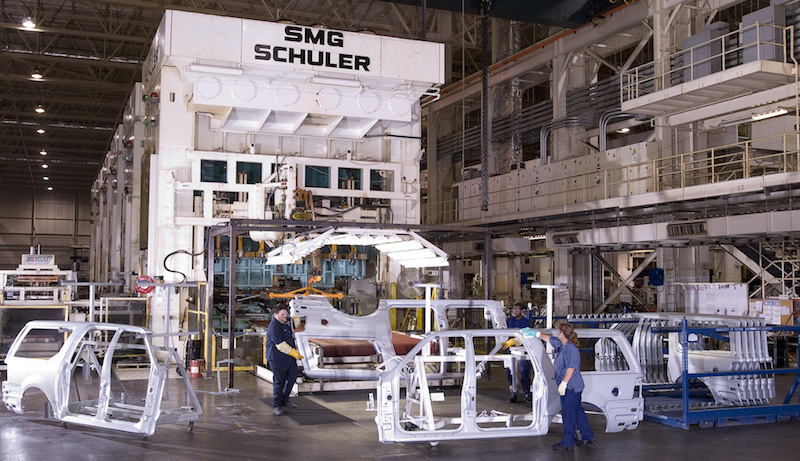 Production of class-A stampings in Clinton Township, Michigan, US
Production of class-A stampings in Clinton Township, Michigan, USNational companies with international ambitionsReturning to the UK, in among the global operations discussed above, there are still some country-specific operations, albeit companies which still have international ambitions. One such company is Sertec, one of JLR’s preferred suppliers of pressings and stampings. Although rather more modest than the investments by Gestamp and others, it is now undertaking a three-year modernisation programme, investing £10m in 12 Zani Motion Master presses, from 250 to 800 tonnes, complete with coil lines and servo feeds. These new Italian-made machines will enable Sertec to move into the supply of steel and aluminium structural stampings for JLR. As well as growing organically, investing in its existing facilities, Sertec has also begun to grow by acquisition; in August 2016, it announced it had acquired WILD, another UK pressings company, which already had manufacturing operations in Germany and Hungary. Making this acquisition was essential to providing Sertec with a European production base, partly to supply JLR from as it moves into its new plant in Slovakia, but also to produce for other vehicle companies inside the EU.
What Sertec is doing, Kirchhoff of Germany has done for many years, namely expanding domestically from a modest base and gradually becoming a truly international player. For example, it opened a plant in Romania in 2012 to supply the Ford B-Max with welded assemblies from parts produced at Kirchhoff’s Hungarian plant. The Hungarian plant also makes hot-stamped parts for the BMW 4-series coupe. Further afield it has invested in Lansing, Michigan to supply parts for the Chevrolet Camaro and next-generation Traverse crossover, as well as in Shenyang, China, to supply to BMW’s nearby Chinese factory.
In Europe, Kirchhoff, which had a turnover in 2015 of over €1.8 billion – around a quarter of the size of Gestamp – has invested in its German, Polish and Spanish plants to support new or expanding contracts for Audi (A4, A5), BMW (2-series Active Tourer), VW (new Crafter van, new Tiguan and Touran), Mercedes (E-class and GLC), Opel Mokka and the Ford Mondeo. Investment for these vehicles focused on equipment for press-hardened steel parts and increased aluminium usage.
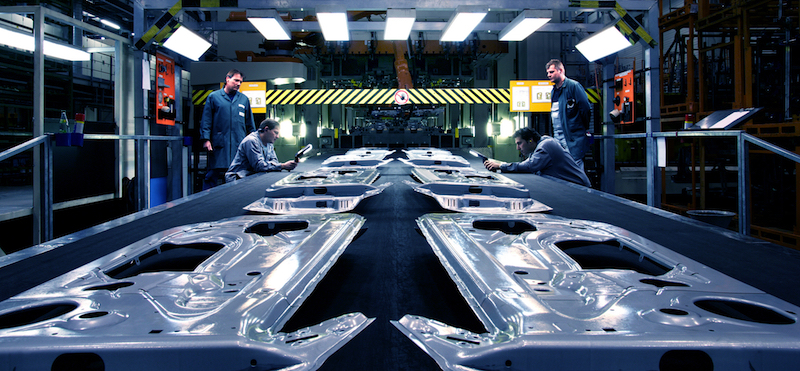 Steel company VoestAlpine has set up a body structures operation that operates worldwide
Steel company VoestAlpine has set up a body structures operation that operates worldwideIn Spain, Kirchhoff has expanded recently on the back of work for the Opel Mokka, for which it supplies nine assemblies, including the rocker panel, bumper systems, cross-car beams, wheel housings and various reinforcements. The work for the Mokka has seen specific investment in two robotic welding cells and a nut-mounting unit. For the Ford Mondeo, Kirchhoff makes a laser-welded dashboard support which consists of more than 60 parts that are joined together by over 160 laser seam welds; and front and rear bumpers by roll-forming before being welded with other smaller parts.
Another pressings company which, despite attempts at moving beyond its domestic base in recent times, remains strongly domestically-oriented, is Magnetto of Italy, part of the CLN group. Magnetto has numerous plants in Italy supplying Fiat models; its Atessa plant makes roll-formed inner steel parts for the Fiat Ducato (and PSA equivalents), and its Cassino plant produces welded assemblies for the different models made there. Further north, in Chivasso Magnetto produces miscellaneous stamped parts and assemblies for Alfa and Maserati, as well as Iveco heavy-duty vans and indeed some VW Toruan components delivered to Germany. One busy plant is near the Fiat Melfi site, producing around 20-30% of the metal parts and assemblies for the Fiat 500X and Jeep Renegade programmes.
So, while the metal pressings market remains dominated by the in-house activities of the car companies, whether for capacity reasons, investment reasons or lack of expertise in certain technologies at the car companies, opportunities exist – and are growing – for the independent sector. Having for many years been dominated by national companies, often supplying one or two vehicle-makers, or even just one or two assembly plants, the independent pressings sector now exhibits similar characteristics – consolidation, major international players and others – evident in other areas of the supply base.





























